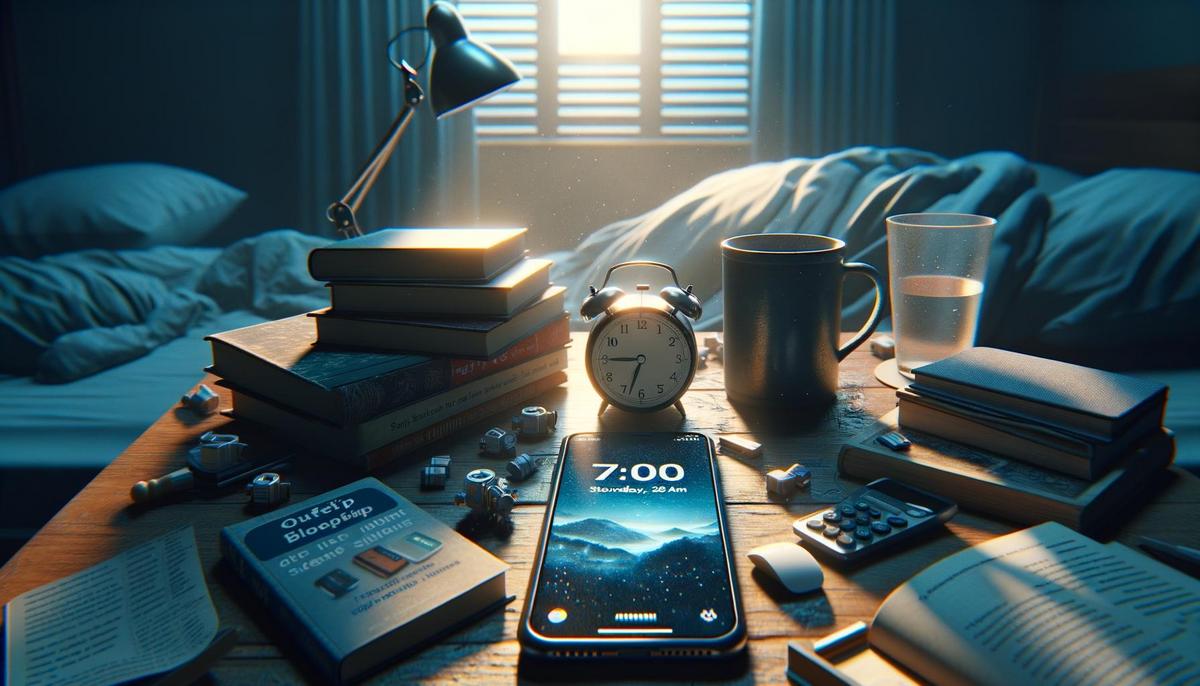The Vital Role of Sleep in Health
Sleep hygiene is the cornerstone of a healthy lifestyle, involving practices and habits that are critical for good quality sleep. Good sleep hygiene ensures you're sharp, upbeat, and ready for the day. It's a blend of various components:
- Sticking to a consistent sleep schedule
- Creating a bedtime routine that signals your body it's time to wind down
- Ensuring your bedroom environment is conducive to sleep, which means it should be cool, quiet, and dark
- Avoiding screens, heavy meals, and caffeine before bedtime
Getting the right amount of sleep is just as important as how you sleep. Adults typically need 7-9 hours per night, but this can vary. Remember, it's not just about quantity; quality matters too. Deep, uninterrupted sleep cycles are the gold standard for truly restorative rest.
The Evolutionary Journey of Alarm Technologies
Alarm technologies have come a long way, from the early days of nature's cues to the latest smart devices. Let's hit the snooze button on the present and take a trip back in time:
- Ancient Times: People relied on natural signs, like the crowing of roosters or the rise of the sun, to wake up.
- Sundials and Water Clocks: These were among the first human-made devices to track time, though not so handy for the night owls.
- Mechanical Clocks: In the 14th century, mechanical clocks with bell alarms entered the scene, a game-changer for timekeeping.
- Peg Alarms: By the 1500s, we saw the introduction of peg alarms, where a peg was placed at the desired wake-up time on the clock's face.
- Wind-up Alarm Clocks: Fast forward to the 19th century, these became household staples, affordable and reliable.
- Electric Alarm Clocks: The 20th century brought us electric alarm clocks, ushering in a new era of convenience.
- Digital Revolution: LED displays and snooze functions entered our bedrooms in the late 20th century.
- Smartphones: Now, our phones serve as alarm clocks, offering a plethora of sounds and features to rouse us from slumber.
These technological leaps have tweaked our sleep and waking patterns in significant ways. As we evolved from natural wake-up calls to artificial ones, the control over our wake-up time tightened. But with that control came responsibility – to choose wisely and not disrupt our natural sleep rhythms.

The advancements in technology have given us more than just convenience; they've offered us personalization. With smart devices, we can now wake up to our favorite tunes, a gentle vibration, or even a simulated sunrise. This evolution reflects not just our ingenuity but also our growing understanding of the importance of a good start to the day. And as we continue to innovate, who knows what the future will hold? Perhaps biometric alarms that wake us up at the perfect point in our sleep cycle. The possibilities are as exciting as they are endless.
DIY Alarm Projects and Community Experiences
Ready to shake up your wake-up routine? Dive into DIY alarm clock projects and put your personal stamp on the morning. Here's the scoop:
- Instructions: Search online for step-by-step guides to create your custom alarm. From basic to advanced projects, options abound for every skill level.
- Benefits: A DIY alarm can be more than a fun project—it can enhance your sleep hygiene. Personalizing alarm sounds, for example, can make waking up a smoother, more pleasant experience.
- Creativity aspect: This is your chance to innovate. Use lights, sounds, or even movement to craft an alarm that's uniquely yours.
Are your mornings more of a horror story than a fairy tale? We want to hear about it! Your challenging wake-up stories can help us all:
- Method of sharing: Drop us a comment, send an email, or tag us on social media with your tales of early-morning woe.
- Collective learning: Your experiences can offer insights into what works (or doesn't) and inspire others to rethink their morning routines.
- Sparking engagements: Sharing your story might just start a conversation, connecting you with fellow groggy risers and potentially leading to new, community-driven solutions.



